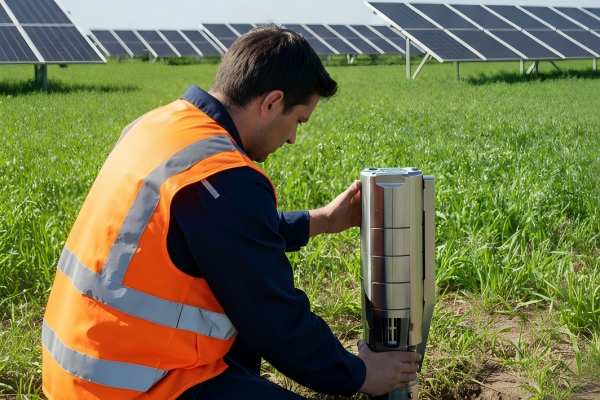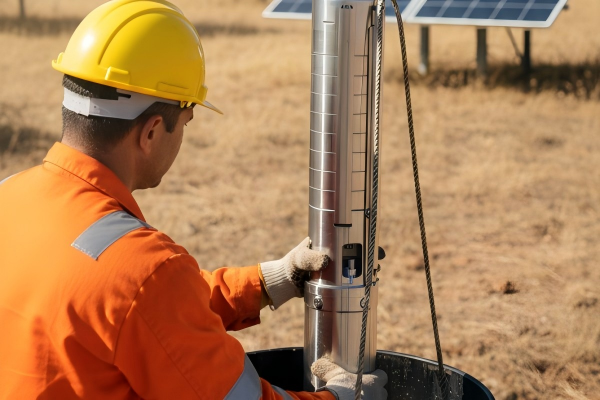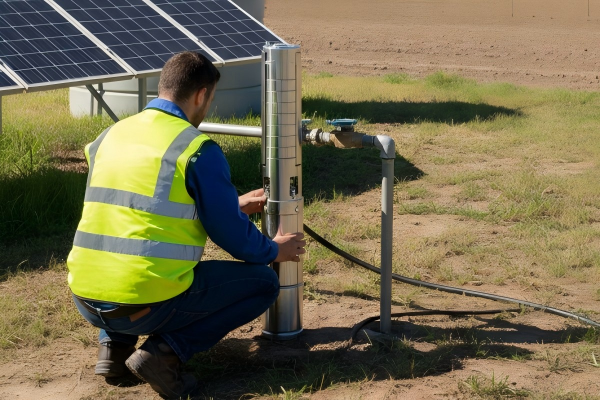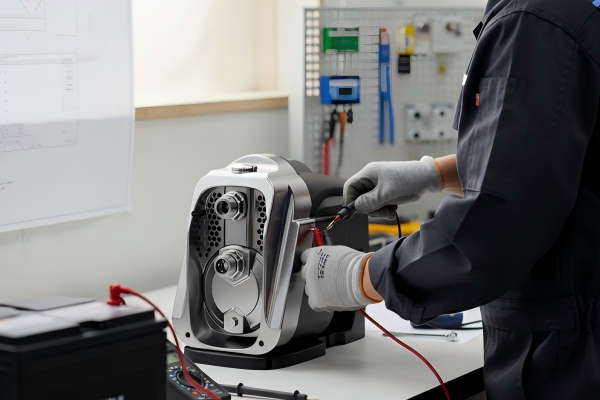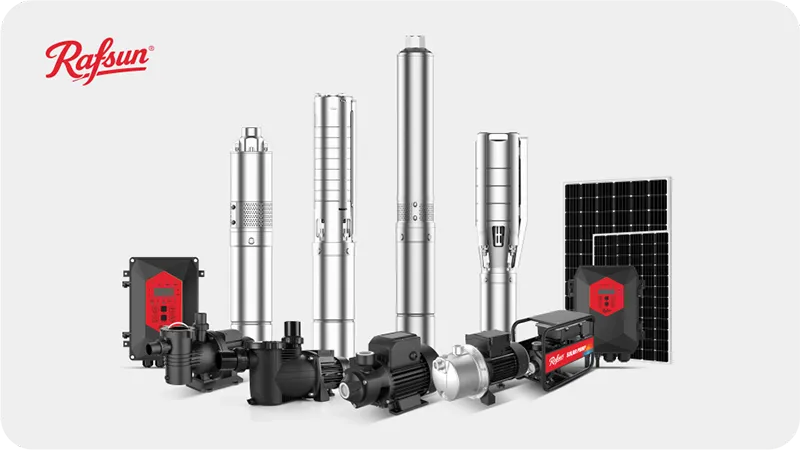Are you seeking a water pumping solution that is both efficient and eco-conscious?
Traditional pumps can be costly and damaging to the environment.
It's time for a cleaner alternative.
A solar pump offers significant environmental advantages by leveraging clean, renewable energy.
It dramatically reduces your carbon footprint, conserves water through efficient operation, eliminates noise pollution, prevents soil contamination from fuel spills, and fosters long-term energy independence. This makes it a superior choice for sustainable water management.
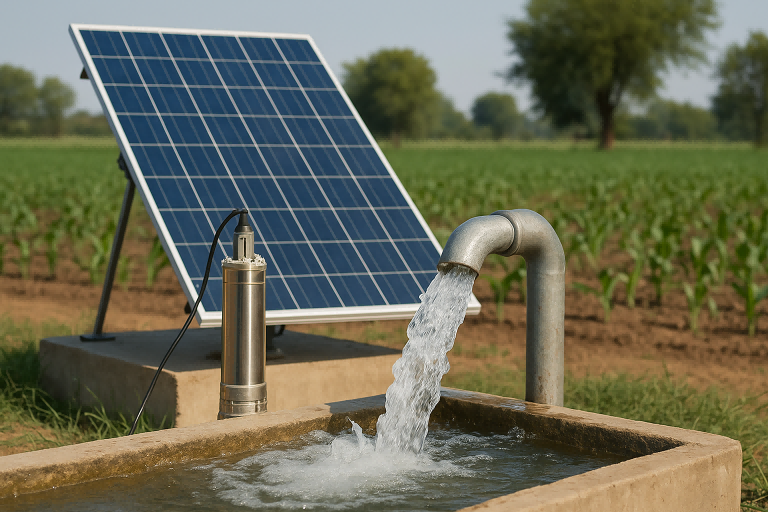
These benefits represent a major shift in how we approach water management.
They move us away from dependence on finite, polluting resources.
Instead, we embrace a solution that works in harmony with the environment.
Understanding each of these green benefits in detail can highlight the powerful, positive impact of switching to solar.
Let's explore how this technology is changing the game for agriculture, communities, and businesses worldwide.
1. Slash Your Carbon Footprint with Solar Power
Worried about your farm or business's carbon emissions?
Diesel pumps are a major source of pollution.
Switching to silent, clean solar power is a direct step towards sustainability.
A solar pump operates entirely on renewable energy from the sun.
This simple fact means it produces zero operational carbon dioxide (CO2).
Unlike diesel engines or grid power from fossil fuels, it directly combats climate change by providing a clean, emission-free solution for moving water.
The most immediate and profound environmental benefit of a solar pump is its ability to eliminate greenhouse gas emissions at the point of use.
This is a critical factor for any individual or business aiming to reduce their environmental impact.
To truly grasp the significance of this, we must look closer at the mechanics and the quantifiable difference it makes.
From Fossil Fuels to Photovoltaics
A conventional water pump system typically relies on one of two power sources.
The first is a diesel or gasoline engine.
The second is the local electricity grid.
Both are often heavily dependent on the burning of fossil fuels.
A solar pump, however, uses photovoltaic (PV) panels to convert sunlight directly into electricity.
This electricity then powers a highly efficient motor, often a brushless DC motor, to pump water.
The entire process is self-contained and free of combustion or emissions.
Quantifying the Carbon Savings
The reduction in carbon footprint is not just a concept; it can be measured.
Consider a common agricultural scenario: irrigating a few acres of land.
A diesel pump running for several hours a day can release tons of CO2 over a single growing season.
A solar pump performing the same task releases zero.
Here is a simplified comparison to illustrate the difference:
| Pumping System | Power Source | Daily CO2 Emissions (Approx.) | Annual CO2 Emissions (Approx.) |
|---|---|---|---|
| Diesel Pump | Diesel Fuel | 20-50 kg/day | 5-10 tons/year |
| Solar Pump | Sunlight | 0 kg/day | 0 tons/year |
Note: Diesel emissions vary based on engine size, efficiency, and runtime.
The numbers clearly show a stark contrast.
By making the switch, a single farm or community can prevent tons of CO2 from entering the atmosphere each year.
This contributes directly to global climate change mitigation efforts.
The Role of Advanced Technology
Modern solar pumping systems are more efficient than ever.
Technologies like Maximum Power Point Tracking (MPPT) play a crucial role.
An MPPT controller is an electronic device that optimizes the match between the solar array and the pump motor.
It constantly adjusts the electrical operating point of the panels to extract the maximum possible power available.
This intelligence ensures the pump works efficiently even in lower light conditions, like early mornings or cloudy days.
This maximizes water output per watt of solar power.
It further solidifies the system's green credentials by making the absolute most of a renewable resource.
2. Enhance Water Conservation Efforts
Are you Wasting precious water with an inefficient pump?
Uncontrolled pumping leads to overuse and runoff.
A smart solar pumping system empowers you to use every drop wisely.
Solar pumps are ideal for precision irrigation and water management.
They provide a consistent, controllable flow that integrates seamlessly with water-saving methods like drip lines.
This targeted delivery minimizes waste from evaporation and runoff, conserving a vital natural resource.
While reducing carbon emissions is a primary benefit, how a solar pump enables better water management is an equally important environmental advantage.
Water scarcity is a growing global concern.
Using technology to improve water-use efficiency is essential for sustainability.
Solar pumps are uniquely suited for this task due to their operational characteristics and compatibility with modern agricultural techniques.
The Synergy with Precision Irrigation
Precision irrigation methods are designed to deliver water directly to the plant's root zone.
This minimizes loss to the surrounding environment.
Drip irrigation and micro-sprinklers are prime examples.
These systems require a steady, often low-pressure, water supply over extended periods.
Diesel pumps, which are often designed for high-volume, intermittent pumping, are a poor match.
They can overwhelm these delicate systems.
Solar pumps, however, excel in this role.
They naturally align with the sun's cycle, providing a gentle, consistent flow throughout the day.
This makes them the perfect engine for water-conserving irrigation, allowing for slow, deep soil saturation that plants prefer.
On-Demand Pumping vs. A "Store and Flood" Model
Traditional pumping methods often involve running a large pump for a short period.
This is done to fill a large storage tank or reservoir.
Water is then released from the tank, often in a less controlled manner like flood irrigation.
This "store and flood" approach is inherently wasteful.
Water is lost to evaporation from the open surface of the tank.
More water is lost to runoff and evaporation during flood irrigation.
A solar pump facilitates an "on-demand" model.
It pumps water directly to where it is needed, when it is needed.
This eliminates the need for large, open storage tanks and reduces the reliance on wasteful irrigation methods.
System Intelligence for Ultimate Control
The true power of water conservation comes from automation.
Modern solar pumping systems, particularly those with advanced inverters, can be integrated with external sensors.
- Soil Moisture Sensors: These devices can be placed in the root zone of crops. They send a signal to the pump controller, telling it to start pumping only when the soil moisture drops below a set threshold.
- Tank Level Floats: For systems that do fill a smaller holding tank, float switches can automatically turn the pump off when the tank is full and on when it is low. This prevents overflows and ensures water is available when needed.
- Timers and Schedulers: Advanced controllers allow users to set precise pumping schedules. This can align with the coolest parts of the day to further reduce evaporation.
This level of automation ensures that water is never wasted.
It is a smart, responsive system that conserves water, saves energy, and ultimately improves crop health.
3. Create a Quieter, More Peaceful Environment
Is the constant drone of a generator disrupting your peace?
That noise pollutes your environment, stresses livestock, and disturbs wildlife.
Imagine a pump that works in complete silence.
Solar water pumps are virtually silent during operation.
This starkly contrasts with the loud, disruptive noise produced by diesel engine pumps.
This absence of noise pollution provides a significant environmental benefit for residential areas, livestock farms, and ecologically sensitive locations.
Noise is an often-overlooked form of pollution.
Its constant presence can have detrimental effects on the health and behavior of both humans and animals.
The whisper-quiet operation of a solar pump is more than just a convenience.
It is a feature that actively restores the natural soundscape and contributes to a healthier, more peaceful environment.
A Sound Comparison: Decibels Don't Lie
The difference in noise level between a diesel pump and a solar pump is not subjective; it is scientifically measurable.
Noise is measured in decibels (dBA).
An increase of just 10 dBA represents a doubling of perceived loudness.
| Sound Source | Typical Decibel Level (dBA) | Perceived Loudness |
|---|---|---|
| Diesel Pump | 85 - 100 dBA | Very Loud / Uncomfortable |
| Conversation | 60 dBA | Normal |
| Library | 40 dBA | Quiet |
| Solar Pump | < 45 dBA | Very Quiet / Near Silent |
As the table shows, a diesel pump can be as loud as a large truck.
This level of noise requires hearing protection for anyone working nearby for extended periods.
A solar pump, on the other hand, is often quieter than a library.
Its sound is typically completely masked by ambient noises like the wind.
The Impact of Noise on Livestock and Wildlife
Animals are highly sensitive to noise.
Constant, loud noise from a diesel generator can cause chronic stress in livestock.
For example:
- In dairy cattle, stress has been shown to reduce milk yield.
- On poultry farms, sudden loud noises can cause panic and injury.
- For grazing animals, the engine noise can disrupt natural behaviors and cause agitation.
The silent operation of a solar pump eliminates this stressor.
It allows animals to remain calm, which can improve their health, well-being, and productivity.
In natural areas or eco-lodges, a loud pump can scare away the very wildlife that people want to see.
A silent solar pump for filling a waterhole or servicing a lodge helps preserve the natural habitat and its inhabitants.
Benefits for People and Communities
The quality of life for people living and working near a pump is also vastly improved.
In a residential setting, a solar pool or sump pump runs without anyone ever noticing.
On a farm, operators can work and communicate without shouting over an engine.
In a small community relying on a solar well pump, there is no noisy generator disrupting the peace of the village day and night.
This simple change fosters a quieter, less stressful, and more pleasant living environment for everyone.
4. Protect Your Land from Harmful Contaminants
Are fuel and oil spills a hidden risk for your operation?
A small leak can poison your soil and groundwater for years.
You must protect your most valuable asset: your land.
Solar pumps require no fuel, oil, or engine lubricants to operate.
This design completely eliminates the risk of chemical spills and leaks.
As a result, it protects the integrity of agricultural soil and vital groundwater sources from contamination, a crucial benefit for farming and drinking water.
The physical footprint of a pumping operation extends beyond the pump itself.
It includes the storage and handling of fuels and lubricants.
Every time a diesel pump is refueled or serviced, there is a risk of spillage.
While a single small spill might seem minor, the cumulative effect can be devastating to the local ecosystem.
A solar pump completely sidesteps this entire category of environmental risk.
The Dangers of Hydrocarbon Contamination
Petroleum-based fuels and oils are toxic to the environment.
When they spill onto the ground, they can cause significant damage.
- Soil Sterilization: Hydrocarbons kill the beneficial microorganisms that are essential for soil health and plant growth. The affected area can become barren for years.
- Groundwater Pollution: Spilled fuel can seep deep into the ground. It can eventually reach the water table. This contaminates the aquifer that may feed drinking water wells and springs far away from the original spill site.
- Costly Remediation: Cleaning up contaminated soil and water is an expensive and difficult process. It often involves excavating and treating large amounts of earth.
By using a solar pump, you proactively prevent these problems from ever occurring.
There is no fuel to spill, no oil to leak, and no risk of contaminating the land you depend on.
Ensuring Agricultural and Potable Water Purity
For modern agriculture, soil and water purity are paramount.
This is especially true for organic farming, where the use of synthetic chemicals is forbidden.
A diesel spill can immediately disqualify a farm from organic certification.
It introduces prohibited substances into the soil.
The clean operation of a solar pump aligns perfectly with the principles of organic and sustainable agriculture.
Similarly, when pumping water for human or animal consumption, purity is non-negotiable.
Using a solar well pump ensures that the water source remains pristine.
It removes the threat of hydrocarbon contamination from the pumping equipment itself.
This provides peace of mind for communities and households that rely on well water.
A Maintenance Advantage without Hazardous Waste
The maintenance routine for a diesel pump involves regular oil changes.
This creates used motor oil, which is a hazardous waste product.
It must be collected and disposed of according to strict environmental regulations.
A solar pumping system has no such requirement.
The pump motors, especially brushless DC types, are often sealed and maintenance-free.
The only "maintenance" is occasionally wiping dust or debris off the solar panels.
This not only simplifies upkeep but also eliminates the need to handle and dispose of hazardous materials.
5. Achieve Long-Term Energy Sustainability
Are you tired of unpredictable fuel costs and an unreliable grid?
This volatility makes planning difficult and expensive.
Break free by powering your water needs with the sun's free energy.
By harnessing solar power, you gain true energy independence.
Solar pumps operate entirely off-grid.
This liberates you from dependence on unstable power networks and fluctuating fossil fuel prices, creating a truly resilient and sustainable water supply system for the long term.
Sustainability is about more than just being "green" in the present moment.
It's about creating systems that can endure and function effectively for decades with minimal external inputs.
A solar pumping system is the epitome of this principle.
It is a long-term investment in self-sufficiency and resilience, offering a stability that fuel-dependent systems can never match.
The Impressive Lifecycle of a Solar Pumping System
A well-designed solar pumping system is built for longevity.
The components have remarkably long operational lifespans.
- Solar Panels: High-quality PV panels are incredibly durable. Manufacturers typically provide a power-output warranty for 25 years or more. They often continue to produce a high percentage of their rated power for 30-40 years.
- Pump & Motor: A high-quality, brushless DC solar pump motor is designed for efficiency and durability. With fewer moving parts than a combustion engine, it requires minimal maintenance and can last for many years.
- Controller/Inverter: The electronic heart of the system is a solid-state device. It has no moving parts and is built to withstand a wide range of environmental conditions.
This durability means a solar pump is not a short-term fix.
It is a piece of infrastructure that provides reliable water for a generation or more.
Economic and Environmental Sustainability Are Linked
| The economic case for solar pumps is a key driver of their environmental sustainability. A system that is affordable to run is a system that will continue to be used. Consider the costs over a 10-year period: |
Cost Factor | Diesel Pump System | Solar Pump System |
|---|---|---|---|
| Initial Cost | Moderate | High | |
| Fuel Cost | High and continuous | Zero | |
| Maintenance Cost | Moderate (oil, filters) | Very Low | |
| Total Cost Over Time | Very High | High (but fixed) |
While the initial investment for solar is higher, the ongoing operational costs are near zero.
You are pre-paying for decades of energy.
This economic stability insulates you from fuel price spikes and supply chain disruptions.
This financial resilience ensures the long-term viability of the system, which in turn secures its long-term environmental benefits.
Building Resilience for Communities and Businesses
Energy independence means resilience.
For a farm, it means irrigation water is always available, even if the local grid goes down or fuel deliveries are delayed.
This protects crops and secures income.
For a remote community, a solar well pump means a reliable supply of clean drinking water.
It is a supply that is not dependent on government subsidies for fuel or the stability of a national power grid.
This empowers communities to manage their most critical resource independently.
It's a sustainable solution that builds a foundation for health, security, and prosperity.
Conclusion
Switching to a solar pump is a powerful environmental choice.
It cuts emissions, saves water, ends noise pollution, prevents contamination, and ensures energy independence for a sustainable, green future.
Frequently Asked Questions
Are solar water pumps environmentally friendly?
Yes, they are highly eco-friendly. They use clean, renewable solar energy, produce zero emissions, and help conserve water, making them a top choice for sustainable water management.
What are the disadvantages of a solar water pump?
The main disadvantages are a higher initial investment cost compared to conventional pumps and a dependency on sunlight, which may require battery or tank storage for nighttime use.
How long do solar water pumps last?
Solar panels typically last over 25 years. A high-quality brushless pump motor and controller can also provide many years of reliable service with very minimal maintenance.
Can a solar pump work at night?
A solar pump can't run directly from panels at night. For nighttime operation, the system needs to include batteries for energy storage, or water must be pumped to a storage tank during the day.
Are solar pumps powerful enough for irrigation?
Absolutely. Solar pumps are available in a wide range of sizes. They can be properly sized to meet the high-volume water demands of large-scale agricultural irrigation.
What is the main advantage of a solar pump?
The main advantage is its ability to operate on free, renewable energy from the sun. This eliminates ongoing fuel costs and provides energy independence from the grid.
Do solar pumps require a lot of maintenance?
No, they are very low-maintenance. They do not require an engine, fuel, or oil changes. Maintenance is typically limited to occasionally cleaning the surface of the solar panels.
How does a solar water pump help the environment?
It helps by eliminating carbon emissions, preventing fuel spills that contaminate soil and water, reducing noise pollution, and enabling more efficient, water-conserving irrigation practices.



